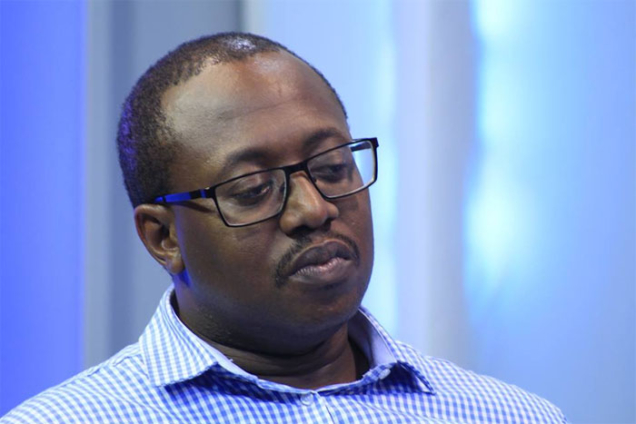The Director of Advocacy and Policy Engagement at the Center for Democratic Development (CDD), Dr. Kojo Asante, has weighed in on the ongoing discussions surrounding the 2024 Provisional Voters Register.
His comments during an appearance on Joy News’ PM Express on Tuesday, came on the heels of an Inter-Party Advisory Committee (IPAC) meeting between political parties and the Electoral Commission (EC) that exposed potential vulnerabilities in the EC’s IT system.
The meeting also prompted a fresh demand by the National Democratic Congress (NDC) for a multi-stakeholder examination of the EC’s IT infrastructure - a demand that Dr. Asante described as “fair” and necessary to ensure the integrity of the upcoming elections.
Dr Asante’s remarks underscored the importance of addressing the IT vulnerabilities within the Electoral Commission’s systems, as these weaknesses could jeopardise the transparency and credibility of the December 2024 elections.
He noted that the EC’s own admissions about the system’s flaws raised valid concerns, particularly for political parties like the NDC.
“The NDC’s request for a multi-stakeholder engagement on the IT system is a fair one,” Dr. Asante said.
Assurances have to be given. It’s not enough for the EC to say, ‘Yes, we’ve sorted it out.’ This needs to be demonstrated with technical expertise.”
He stated that electoral integrity rests on more than just verbal assurances—it requires a transparent process of verification involving all stakeholders, including the Electoral Commission, political parties, and IT experts.
Read also: NDC raises concerns over IT system vulnerabilities in Electoral Commission’s voters register
“The same principle applies to the release of the corrected provisional voters register. Just like political parties will verify the voter data, they should also be involved in the process of verifying the security of the IT system,” he added.
Dr. Asante revealed that the Electoral Commission had already engaged a service provider to conduct a system-wide vulnerability test to assess and rectify any flaws.
He saw this as a positive step but insisted that further engagement with political parties and technical experts was essential to ensure that the system could not be infiltrated or manipulated.
“It’s important to remember that this is not just a technical issue; it’s a matter of national interest. If the IT system is vulnerable, it opens the door for manipulation. We can’t afford that in an election,” Dr. Asante said.
He also highlighted that the EC had introduced new technology, such as a “liveliness check,” to address one of the identified problems related to illegal voter transfers.
However, he argued that this was only a partial solution and that a comprehensive review of the system’s overall security was still needed.
Dr. Asante stressed the need for an inclusive, multi-stakeholder approach to resolve the issues surrounding the EC’s IT infrastructure.
He expressed surprise that independent candidates and civil society groups were not invited to the recent IPAC meeting, given their vested interest in the electoral process.
“I was expecting that independent candidates and civil society groups should have been invited to this meeting. The voter register is important to anyone participating in the election. I don’t see why they were left out,” he stated.
He recommended that future meetings bring together all interested parties—including political parties, civil society, and technical experts—to ensure a holistic resolution of the EC’s IT vulnerabilities.
“After the progress we’ve made, this matter should not drag on,” he warned.
Dr. Asante called for a structured, collaborative approach moving forward, suggesting that the EC invite interested stakeholders to engage directly with its IT department.
He argued that a one-time meeting involving all parties would prevent future delays and improve the transparency of the electoral process.
“The EC has already said they are doing a self-assessment. Why not extend that by inviting IT experts from political parties and civil society to verify the steps they’ve taken? This could prevent unnecessary delays and build trust,” he concluded.
Latest Stories
-
#Manifesto debate: NDC to enact and pass National Climate Law – Prof Klutse
8 mins -
‘Everything a manager could wish for’ – Guardiola signs new deal
18 mins -
TEWU suspends strike after NLC directive, urges swift resolution of grievances
25 mins -
Netflix debuts Grain Media’s explosive film
53 mins -
‘Expired’ rice scandal: FDA is complicit; top officials must be fired – Ablakwa
1 hour -
#TheManifestoDebate: We’ll provide potable water, expand water distribution network – NDC
2 hours -
IPR Ghana@50: Pupils educated to keep the environment clean
2 hours -
PenTrust CEO named ‘Best Pensions CEO’, company wins ‘Scheme Administrator Award’ at Ghana Accountancy & Finance Awards 2024
2 hours -
Alan Kyerematen’s ‘Brighter Future for Health Professionals’ in Ghana Revealed in Bono
2 hours -
#TheManifestoDebate: NPP will ensure a safer, cleaner and greener environment – Dr Kokofu
2 hours -
2024 Election: Police to deal with individuals who will cause trouble – IGP
2 hours -
Seychelles President’s visit rekindles historical and diplomatic ties with Ghana
3 hours -
Election 2024: EC destroys defective ballot papers for Ahafo and Volta regions
3 hours -
2024 Election: I am sad EC disqualified me, but I endorse CPP’s candidate – PNP’s Nabla
3 hours -
I want to build a modern, inclusive country anchored by systems and data – Bawumia to CSOs
3 hours

